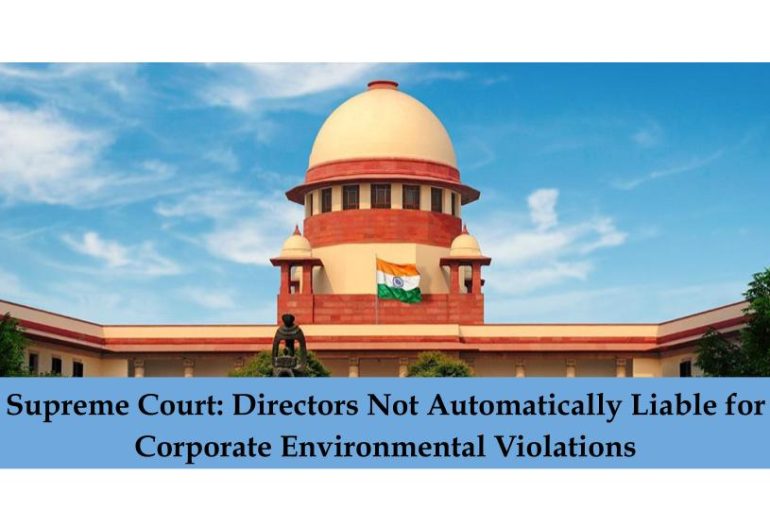Supreme Court: Directors Not Automatically Liable for Corporate Environmental Violations
A two-Judge Bench of the Hon’ble Supreme Court comprising Justice J.B. Pardiwala and Justice R. Mahadevan issued an order dated 02.01.2025 in the matter of Sanjay Dutt & Ors. v. The State of Haryana & Anr., Criminal Appeal No. 11 of 2025 (@ SLP (Crl) No. 7464/2024). The case addressed the criminal liability of directors of Tata Realty and Infrastructure Ltd. and Tata Housing Development Co. for the alleged illegal felling of 256 trees and 62 small plants in Gurugram, Haryana, using machinery.
FACTS:
Sanjay Dutt (Appellant No. 1), Kamal Sehgal (Appellant No. 2), and Satpal Singh (Appellant No. 3) were the Managing Director and Chief Executive Officer of Tata Realty and Infrastructure Ltd. and Tata Housing Development Co., General Manager, and Assistant Vice President (in the Corporate Relations Group and former Senior Manager of the company Sector 113 Gatevida Developers Private Limited), respectively, at the relevant time.
A complaint dated 07.09.2022 was filed before the Hon’ble Presiding Officer, Special Environment Court, Faridabad, under Section 4 (Power to regulate, restrict or prohibit certain activities within notified areas) of the Punjab Land Preservation Act, 1900 (PLPA) pursuant to Forest Damage Report No. 079/495 filed by the Range Forest Officer.
The report alleged that the Appellants had illegally uprooted 256 trees and 62 small plants situated in Sector 113, Gate Vida, Gurugram, using JCB machines and bulldozers, leading to significant environmental damage and a loss of ₹90,580 for the Forest Department.
The Hon’ble Presiding Officer took cognizance of the complaint under Section 19 (Penalty for Offences) of the PLPA.
The Appellants approached the Punjab & Haryana High Court to quash the proceedings by relying on Section 482 (Saving of Inherent Powers of the High Court) of the Code of Criminal Procedure, 1973 (CrPC). However, their petition was dismissed vide order dated 08.12.2022 in CRMM No. 55268 of 2022.
On being further aggrieved, the Appellants filed an appeal before the Hon’ble Supreme Court.
ISSUE:
Whether the directors or office bearers of a company could be held vicariously liable for merely authorizing the commission of environmental offences.
DECISION BY THE SUPREME COURT:
On interpreting Sections 4 and 19 of the PLPA, the Hon’ble Supreme Court observed that the directors or office bearers of the company cannot be held vicariously liable unless they are personally involved in or responsible for the alleged offence.
The Court emphasized that individual liability would render a person subject to prosecution under Section 19 of the PLPA.
After examining the allegations, the Court found that the Appellants were not directly responsible for the illegal uprooting of trees and plants at the site. It was noted that:
- Neither the individuals who physically uprooted the trees nor the company granted the development license were named as accused in the complaint.
- The lower courts had erroneously assumed liability on behalf of the Appellants without proving their personal involvement.
The Supreme Court clarified that:
- The liability of directors is not automatic and arises only when the company is held liable and the director’s personal involvement is established.
- Vicarious liability can be assumed only when explicitly provided in the statute and when the director’s actions directly contribute to the offence.
The Court held that the High Court had erred in examining the Appellants’ liability under Section 19 of the PLPA. Consequently, the appeal was allowed, and the impugned complaint and cognizance order were quashed.
CONCLUSION
The Hon’ble Supreme Court clarified that directors of a company can only be held vicariously liable if they are personally responsible for the act or offence. It further emphasized that clear allegations and statutory provisions must be established to impose liability on directors or office bearers. The judgment highlights the importance of defining the limits of vicarious liability in cases involving corporate offences.
Parvati Arun
The Indian Lawyer and Allied Services
If you want to learn more on the impact of Lease Agreements visit our YouTube channel The Indian Lawyer Legal Tips on the link below –





































Leave a Reply